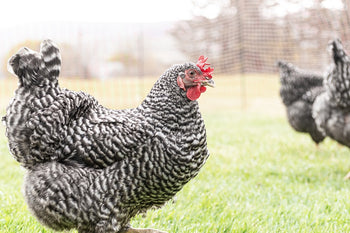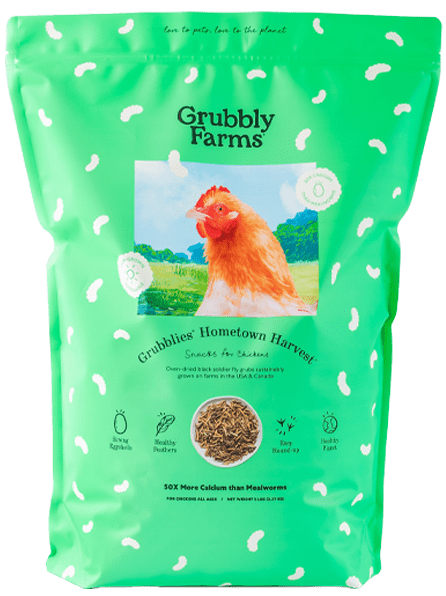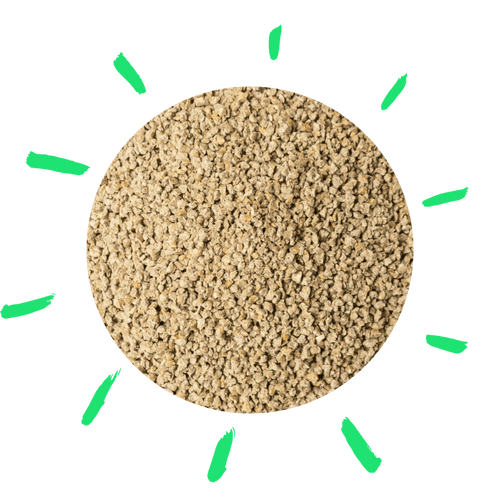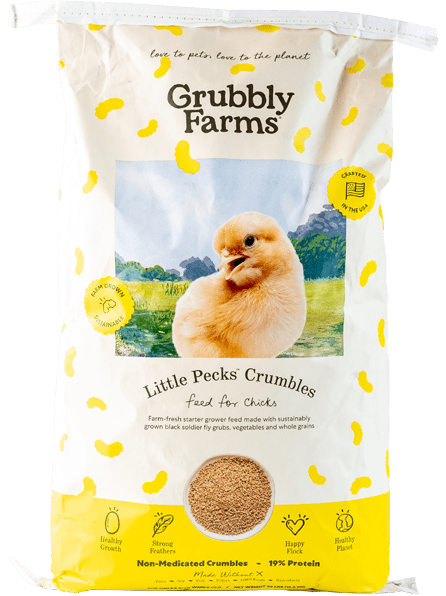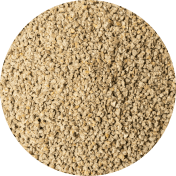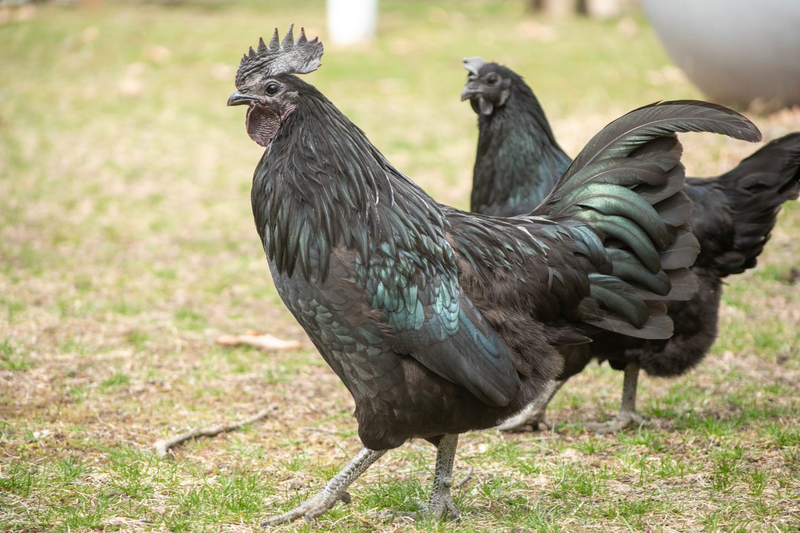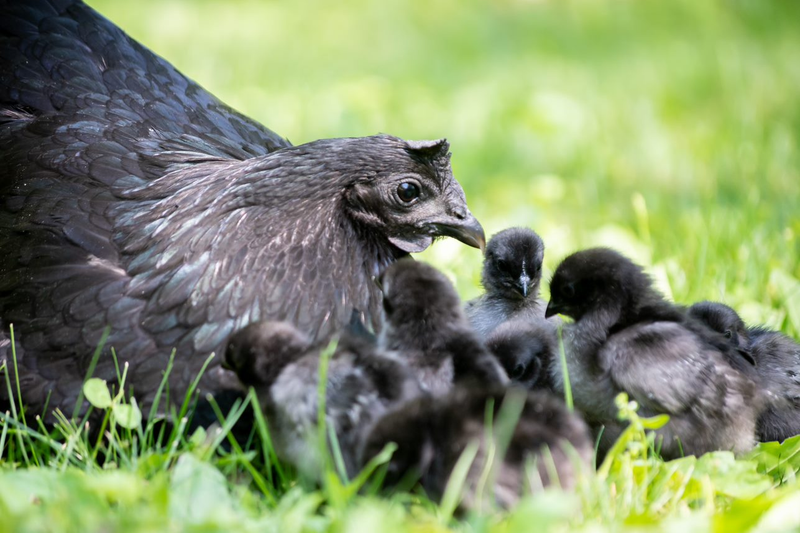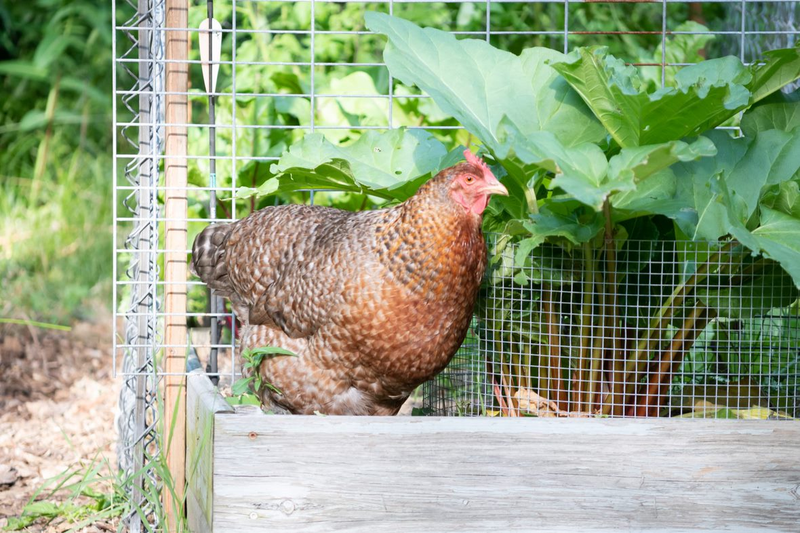Plymouth Rock chickens are a popular breed to add to backyard flocks. The most common variety, the Barred Plymouth Rock, is an eye-catching bird with distinct black and white barred feather patterns. Besides looks, Plymouth Rocks have many features that make them a great choice for a productive, friendly, and enjoyable backyard flock!

Plymouth Rock Chicken Characteristics
The Plymouth Rock chicken breed was first recognized by the American Poultry Association (APA) in 1874. They are considered a heritage chicken breed and one of the first to be developed in the United States. There are several varieties of Plymouth Rock chickens recognized by the APA, including barred, blue, buff, Colombian, partridge, silver penciled, and white. The Barred Plymouth Rock is the most common variety, while the others are rarer and usually only sold by dedicated Plymouth Rock breeders.
Plymouth Rock chickens were developed as a dual-purpose chicken breed, supplying both eggs and meat in the early colonial days. Over the years, the Plymouth Rock has been bred more for egg production. Their body shape is triangular, a characteristic of good laying breeds. However, they also have a full breast and a broad back, which you see in good meat birds.

Plymouth Rocks have loose, soft feathers that lay close to the body, giving them a smooth appearance. They are yellow-skinned (a characteristic of all American class chicken breeds) and are clean-legged with four toes on each foot. Plymouth Rocks have a single comb that should have five points and stand erect. Their beak is horn colored and all varieties have bright red facial features and bay-colored eyes.
Plymouth Rock hens weigh around seven and a half pounds and roosters weigh around nine and a half pounds. A bantam version of the Plymouth Rock chicken is recognized by the American Bantam Association. These birds weigh two and a half pounds for hens and three pounds for roosters.
Egg Production- Plymouth Rock hens are good egg producers, laying about 200 to 280 eggs per year. That is roughly four to five eggs per week. Hens need 12 to 16 hours of light each day to lay, with younger birds requiring less exposure.
Plymouth Rock hens lay light brown eggs that are medium to large in size. Different strains of the Plymouth Rock breed may lay eggs with slightly different hues of brown. This is dependent on the color of the bloom applied to the egg just before being laid. Bloom color can further vary between individual hens within a breed.
Plymouth Rocks are very good wintertime egg layers. Hens over one year of age will take a break from laying in late summer and fall for the annual molt. At all times of the year, laying hens need proper nutrition. A complete layer feed along with supplemental calcium in the form of crushed oyster shells keeps Plymouth Rock hens productive.
Temperature Tolerance- Heritage chicken breeds are adaptable and hardy, of which the Plymouth Rock is no exception. Plymouth Rocks are both cold-hardy and heat-tolerant. Their large bodies and small combs and wattles make them well-suited to colder climates. However, you should still take the appropriate measures to prevent cold stress, such as winterizing the chicken coop, reducing exposure, providing heated water, and offering high-protein snacks during the winter.
Plymouth Rock chickens are fairly heat tolerant, but not as much as lighter, Mediterranean-class chicken breeds. During very hot weather, they are prone to heat stress. Know how to recognize and treat heat stress in chickens to keep your flock comfortable during the summer.
Plymouth Rocks are adaptable to just about any climate. Always make sure they have sheltered, clean, and dry living conditions to keep them healthy and prevent disease.

Plymouth Rock Chicken Care
Caring for Plymouth Rocks is like caring for any other chicken breed. They need proper housing, complete nutrition, and daily care to stay healthy and productive.
Adult Care- Plymouth Rocks need a safe, predator-proof coop. The coop should have roosts, nesting boxes, and a door that allows the Plymouth Rocks access to an outdoor enclosure. Since Plymouth Rocks are a large chicken breed, they need plenty of space in both the chicken coop and the enclosure. Allow at least three to four square feet of coop space and eight to ten square feet of enclosure space per bird.
Plymouth Rock chickens need a complete layer feed, though you can also provide healthy snacks and treats in moderation. Most Plymouth Rocks are not picky eaters and love whatever table and garden scraps you throw into their pen! Keep the treats balanced and nutritious to prevent obesity.
As a heritage chicken breed, Plymouth Rocks benefit from supplemental protein in their diet. A daily snack of dried grubs is a great way to offer more protein. You should also provide supplemental calcium for laying hens.
This breed needs daily care like any other chicken. Keep their space clean, ensuring that both the coop and enclosure stay dry and well-ventilated. Make sure your flock always has access to food and fresh, clean water. A monthly health check can help you keep tabs on the well-being and productivity of your flock.
Chick Care- Plymouth Rock chicks have the same brooding requirements as any other chicks. They need a safe brooder that provides them with easy access to food, water, and supplemental heat. The brooder litter should be absorbent and easy to clean.
These chicks benefit from a high-protein starter feed. A protein level of around 24% is ideal for the first four to eight weeks of life. You can introduce Plymouth Rock chicks to healthy snacks like dried grubs (a source of protein), scrambled eggs, or leafy greens. Just make sure they have access to chick grit to help them digest the new foods.
Plymouth Rocks are a fast-maturing breed, so the brooder space must expand as the chicks grow. They will feather out quickly and can usually be weaned off supplemental heat once they have their first set of feathers, which is any time after four weeks of age. The young birds can be moved outside when the temperature remains above 55°F and the birds are fully feathered, which is usually around eight to twelve weeks of age.
Plymouth Rock pullets will start laying around 20 to 24 weeks of age. Plymouth Rock cockerels will be distinguishable from pullets by their larger combs and wattles. They will also have thicker legs and start crowing.
Common Health Issues
Plymouth Rock chickens are a very hardy chicken breed, meaning they are not prone to any specific health problems. However, they can still be susceptible to sickness and disease when exposed to pathogens or are not properly taken care of. Good breeding and proper management are essential for raising a healthy flock of Plymouth Rocks. The closer your Plymouth Rocks meet the breed standard set by the American Poultry Association, the more hardy your birds will be.
Common Health Concerns- Some common health concerns to look for include respiratory issues, Marek’s disease, and parasites. You can prevent respiratory issues by controlling dust in the coop and ensuring it is well-ventilated. Prevent external parasites by ensuring your flock can dust bathe and sunbathe regularly. Routine worming and exposure control can help prevent internal parasites from becoming a problem.
Bumblefoot- Since Plymouth Rocks are a large chicken breed, they can be prone to bumblefoot, which is a staph infection of the foot pad. You can prevent bumblefoot in chicks by not adding perches to the brooder until after they are four weeks old. To prevent this ailment in adult chickens, keep perches no more than one foot off the ground. Also, make sure any roosting or walking surfaces are free of splinters or sharp edges that can injure a chicken’s foot pad.
Frostbite- Plymouth Rock roosters have large combs and wattles, making them prone to frostbite in the winter. Keep the coop dry and well-ventilated, and protect the roosters from cold exposure to prevent frostbite. You can also apply a beeswax-based salve to the rooster’s comb and wattles to prevent moisture from freezing on their skin.
Reproductive Health- Since Plymouth Rocks are mostly used for egg production, you should pay attention to your flock’s reproductive health. You can prevent a lot of reproductive-based health issues through good breeding. Make sure laying hens receive proper nutrition and supplemental calcium for healthy egg production. Familiarize yourself with the signs and symptoms of egg binding or internal laying so you can catch such incidents before they become fatal.
Disease Prevention- If you notice one of your Plymouth Rocks exhibiting signs of illness, quarantine the chicken away from the rest of the flock. You will be able to diagnose and treat the chicken more effectively and prevent any pathogens from spreading. Practice good biosecurity, keep a clean coop, and ensure your Plymouth Rocks get a proper diet to keep them healthy.

Plymouth Rock Lifespan
A characteristic of all heritage chicken breeds, including Plymouth Rocks, is a longer natural lifespan than hybrid breeds. The average lifespan of a well-bred Plymouth Rock chicken is more than ten years. Some will live upwards of 20 years with good care. Keep in mind that Plymouth Rock hens will be the most productive for the first two to three years of their life. As they age, laying will slowly decline and may stop completely.
However, several factors can influence the longevity of your Plymouth Rocks. For instance, a well-bred Plymouth rock will generally live longer. Additionally, providing your flock with a proper diet, reducing stress factors, and preventing diseases can help Plymouth Rocks live longer.

Suitability for Backyard Flocks
Plymouth Rocks are a great chicken breed for backyard flocks. Since they are considered a dual-purpose breed, they can be used for either meat or egg production. However, most backyard chicken raisers like Plymouth Rocks for their excellent egg production.
Here are some of the other factors that make this breed great for backyard flocks:
Temperament- Plymouth Rock chickens are docile, calm, and friendly. The more you handle the chicks when they are young, the friendlier they will be as adults. Plymouth Rocks are great around children, although some individual roosters can be more assertive than others.
Noise- Plymouth Rocks are a fairly quiet breed. The hens will chatter amongst themselves and occasionally burst forth in an egg song, but their noises are moderate in volume. As with any chicken breed, the roosters crow no matter the time of day!
Easy Management- Plymouth Rocks get along well with other chicken breeds in a mixed flock. They will often be at the top of the pecking order, but they are not known to be bullies. Plymouth Rocks are also excellent foragers. If given the chance to free-range, they can forage for food to supplement their daily diet. They can also adapt well to confinement if they have a spacious coop and run. Plymouth Rock hens will occasionally go broody, but this is not a defining characteristic of the breed.
Conclusion
Plymouth Rock chickens are a fun and friendly breed to add to your backyard flock! They are highly versatile and can be raised for meat or eggs, and in a free-range or confined environment. This breed is both cold-hardy and heat-tolerant, making them suitable for almost any climate.





